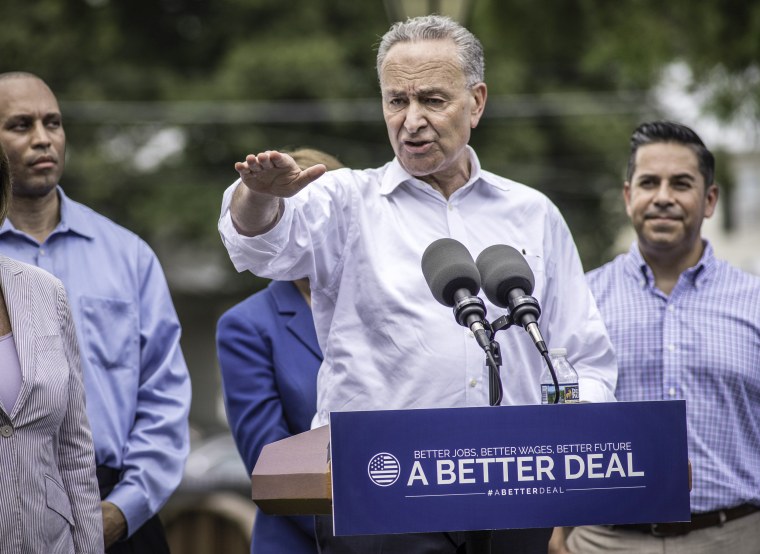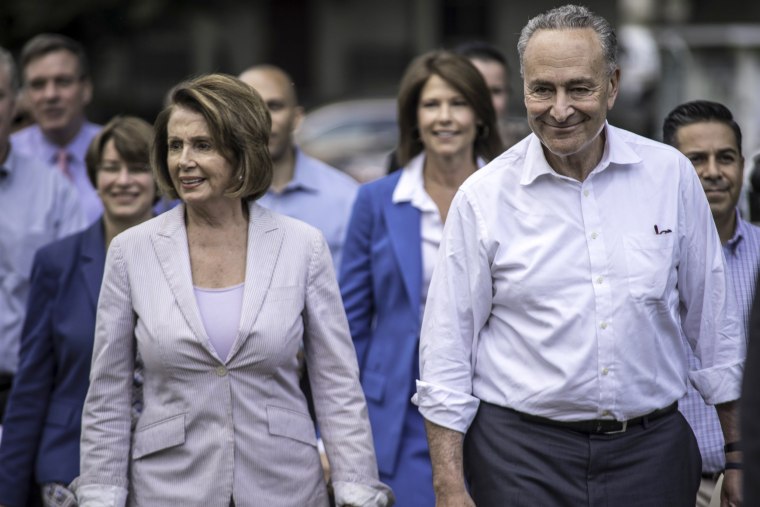BERRYVILLE, Va. — Surrounded by barns and a gazebo in this quaint Southern town, Nancy Pelosi and Chuck Schumer were far from their respective bases in San Francisco and Brooklyn.
The Democratic Party’s top two congressional leaders and a handful of their colleagues came to this slice of Real America on Monday to unveil the party's new populist message that borrows more from Donald Trump than Hillary Clinton as Democrats try to reorient their out-of-power party.
"Too many Americans don’t know what we stand for," Schumer said with his sleeves rolled up in the sweltering July heat. "Not after today."

After seven months of planning and polling, party leaders settled on an economics-first "Better Deal" message for the 2018 midterm elections that aims to find the center of as many overlapping circles in the Democratic Party’s complicated Venn Diagram as possible.
"What we’ve tried to do here is to choose things that just about every Democrat can support, but that really resonate with the American people," Schumer told reporters after his speech.
They promised better jobs, better wages, better health care — and even cheaper beer — powered by a rediscovery of Progressive Era trust-busting.
"There's something in there for all wings of the party, from Warner to Warren," said Matt Bennett, a senior vice president at the centrist Democratic think tank Third Way, referring to Sens. Mark Warner, a Virginia moderate, and Elizabeth Warren, a Massachusetts liberal, both of whom were on stage to promote the plan Monday.
It’s a message that responds to the post-election consensus of everyone from Bernie Sanders to union leaders to red-state Democratic governors to liberal policy wonks.
"Too many Americans don’t know what we stand for." —Sen. Chuck Schumer
Whether voters will buy the new approach being delivered from the same leadership remains to be seen. Notably, Warren earned the loudest applause and was mobbed by supporters when she left the stage.
But the social issues that defined Clinton’s anti-Trump campaign and motivate many of the party's base voters were entirely absent. While the leaders promised more to come, there was nothing Monday on racial justice, immigration, LGBT rights, abortion or guns.
It's a decision that recognizes that midterm voters tend to be whiter and older. But it's one that could alienate minority voters, who often feel taken for granted by the party.
Rep. Ben Ray Lujan, D-N.M., the chairman of the Democratic Congressional Campaign Committee and one of two people of color on the stage of 10 lawmakers, said individual members of the party would still emphasize those issues.
"It’s not to eliminate anything or keep anything out," Lujan said in an interview after the event. "But it’s to make sure that we’re encouraging our colleagues to center in and around a real economic conversation with the America people."
And the pocket-book agenda explicitly left no room for what might be called the Rep. Maxine Waters, D- Calif., wing of the party, which wants to focus on taking down Trump.
Related: Fact Checking Trump's Health Care Claims
Rep. Cheri Bustos, D-Ill., who was involved in drafting the agenda, and the only member of Democratic House leadership from a district Trump won, said that was intentional.
"People aren’t proactively talking about impeachment or about Russia. What I hear every time I go home is about health care…and growing the economy," she said.
Many in her party agree with that sentiment. They feel Clinton spent far too much time attacking Trump last year and not enough talking about what she would do to help people, and they worry Democrats are repeating that mistake again now.
But Trump, via his son-in-law Jared Kushner’s meeting with congressional investigators, still managed to overshadow the event and blot out coverage on TV.
But with Trump in the White House, Democrats were liberated from having to defend the status quo of Barack Obama's economic recovery, which left many hurting even as overall numbers improved.
Sounding a bit like Bernie Sanders or Warren, the Democratic lawmakers took turns railing against an economy rigged by special interests in Washington to benefit the rich and powerful.
Al Quinlan, a Democratic pollster who surveyed voters in dozens of battleground districts on behalf of House Democrats, told the party that people were not feeling the economic recovery their former president and Clinton, his chosen successor, often touted.
"Both base Democrats and swing voters are deeply dissatisfied with the direction of the economy and their place in it," Quinlan wrote in a memo to the DCCC. "Just 17 percent of Democrats and 22 percent of swing voters say their personal financial situation is improving."
Democrats pinned those problems on Republicans, even though Obama left office just seven months ago, and said they were would stand with the people in fighting those interest.
In no uncertain terms, Schumer said the party would address that by taking a page from Trump.
"President Trump campaigned on a populist platform of talking to working people. That’s why he won," Schumer said. "But as soon as he got into office, he abandoned them, making alliance with the powerful…leaving a vacuum on economic issues. We Democrats are going to fill that vacuum."
Perhaps most interestingly on policy, the message revives the fight against corporate monopolies, which have gained new urgency among liberal economists as industries from airlines to media to eyeglass manufacturers to yes, beer makers, grow increasingly concentrated.
"Democratic politicians haven’t talked about this at all for decades," said Marshall Steinbaum, a senior economist at the Roosevelt Institute.

